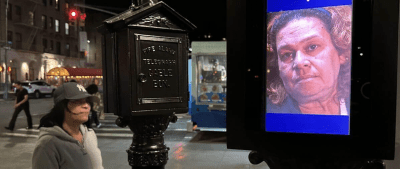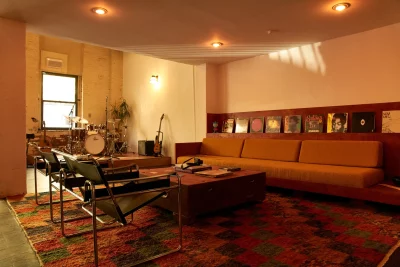Photo by Merissa Blitz
An Ode To Entropy: Arthur Moon’s ‘Chaos! Chaos! Chaos! Side B’
Songwriter Lora-Faye Åshuvud uses a kaleidoscope of electronic sound to explore the chaos of gender and self
Like Björk’s “Utopia,” the latest album from Brooklyn avant-pop group Arthur Moon is named for the music within it. “Chaos! Chaos! Chaos! Side B” (out June 1 via Switch Hit Records) is bursting with synthetic flourishes and jagged orchestrations, the album’s frenetic songwriting forging a lush environment of unbridled chaos. It’s “coherently incoherent,” as described by band leader Lora-Faye Åshuvud.
“I was coming to understand some big shit around gender,” they tell me on a call from their home studio in Flatbush, two large black studio monitors flanking them on either side. “I wanted to make a record that felt like it expressed the cohesiveness of all that in one experience, but also this fractured incoherence of that experience.”
A counterpart to “Side A,” released in 2021, “Side B” incorporates the “statement pieces” of the broader concept. It finds the group — including Cale Hawkins, Martin D. Fowler, Dave Palazola and Aviva Jaye — releasing their most ambitious work to date. Together, the two sides form one album of sprawling and sophisticated electronic pop.
Åshuvud, born and raised in Brooklyn, recently came out as non-binary after spending years writing music reflecting on queerness. Much of the turbulent energy driving this new album was fostered from that transition; the songs on “Side B” illustrate how unpretty and weird moments within that can be.
“[It’s] like a mix CD your friend made for you in high school, like scrolling through the perfect TikTok algorithm, like the experience of gender I was having at the time,” they note in the album’s press release.
Thus, from its opening moments, the music of “Side B” is off-kilter. The opening “Ghost Ranch,” a fanciful ode to Georgia O’Keeffe, details the negative space within her photographs over twitchy electronic production and bounding bass movements. “So long illusion,” Åshuvud sings in a crush of harmonies, synthesizers lurching from the outer boundaries of space into frame. A crunchy, unaccompanied guitar cuts through the gurgling arrangement in a snappy interjection; “Now there’s nothing holding me,” Åshuvud relishes.
Such “illusion” could represent a defining characteristic of “Side B”: The illusion of gender performance. On the bursting “7 O’Clock Clap,” Åshuvud addresses a sort of metamorphosis, the act of molting one’s self to break free from a constricted body. “ You’re a foreigner/ In your own production/ In your own bed/ In your own body,” they sing in a hushed tone, the frothy synthetic and percussive sounds popping like blossoming fruit on bud-breaking vines. Such masterful production recalls the sage-like experimentalism of Björk’s later releases with the fresh, textural palate of artists like Dirty Projectors and Kaitlyn Aurelia Smith.
“[‘7 O’Clock Clap’] felt like it was exploring the connection between thinking about gender performance in a straightforward way and trying to apply that framework to thinking about being a performer and performing music,” they explain. “It’s how gender is both a part of that and can explode within that.”
The heavenly “It Calls” adds depth to that idea. “Healing, holy, divine, divide me,” they sing, sharing fractured melodies with labelmate Raia Was on top of a bouncy, swinging beat. In hocketing (a form of call and response) with their bandmates, Åshuvud further explores an inherent sense of fragmentation.
“I was realizing as I was making this record that [hocketing] was a very concise tool for expressing the feeling I was having at the time,” they say. “You’re passing the melody back and forth between different people with different perspectives.As I was thinking about it, I came to realize that the whole record itself sort of felt like a broader hocket, this cohesive expression of something that is totally disjointed.”
As a whole, the album plays as a kaleidoscope of evolution and ambiguity. The thumping “Get Back” finds Åshuvud unpacking God and sex within the frenzy of a drum and bass groove. “The Hollow” is a gorgeously orchestrated ballad, both cinematic and existentially probing (“Is this a moment?/ Am I a token?”).
And then, through the filter of static on an FM dial, a rollicking pop rock song emerges from the white noise, as if it was beamed in from 25 years ago. “Trouble,” a tune Åshuvud wrote back in 2015 and describes as “weird, Spin Doctors ‘90s music,” provides context of their transformation.
“It felt like it had this early chaotic tension, like it’s my little rock band playing our four chord song, but there’s a real darkness in the lyrics about trauma, and alcoholism, and intergenerational bullshit,” they comment. “But that kind of tension had wormed its way back into what I was doing on [“Side B”].”
Though “Side B” is a stunning work, it’s the journey it takes you on that proves most compelling. Cutting through the density of the album is a crystalline story of transition and regeneration. I ask Åshuvud if this concept was planned out beforehand. “I cannot work that way,” they say; “I’m just mostly flying blind.”
“I’ll project my queerness onto people who maybe wouldn’t use this language, but I think there’s a sort of deep interest and commitment to the power of doing things incorrectly and seeing what happens, and embracing the ecstasy and magic of what happens when you fuck things up.”
And so entropy still reigns.
You can see Arthur Moon perform live on Wednesday May 31 at Public Records in Brooklyn.
You might also like 


























